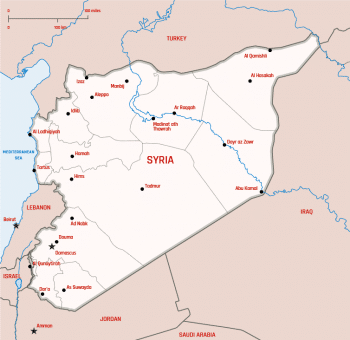 Syria enters its eighth year of a bloody and unforgiving war. The death toll is catastrophic. After the number reached 200,000, the United Nations stopped keeping count. It is estimated that of a population of 23 million, close to half a million have been killed. Mortuary counts are unreliable. The numbers do not clearly state how many of the dead were fighters and how many were civilians. They do not say how many were killed by the government and its allies and how many were killed by the various rebel groups.
Syria enters its eighth year of a bloody and unforgiving war. The death toll is catastrophic. After the number reached 200,000, the United Nations stopped keeping count. It is estimated that of a population of 23 million, close to half a million have been killed. Mortuary counts are unreliable. The numbers do not clearly state how many of the dead were fighters and how many were civilians. They do not say how many were killed by the government and its allies and how many were killed by the various rebel groups.
Half of Syria’s population is displaced, the majority of them within the country. Turkey, Lebanon and Jordan host most of the Syrians who have fled the country. Cities – such as Aleppo and Homs – have been devastated by the violence. Hunger stalks the land. So does illiteracy and disease. This is even more tragic because Syria – for all its problems – had a population that did not suffer from the list of problems faced by many formerly colonised states. The descent into hell has been swift.
A Mirror of Rival Interests
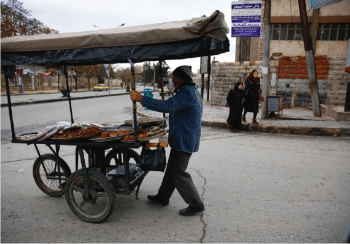 Peace talks in Geneva (Switzerland) and Astana (Kazakhstan) seem never to move forward. Syrians are often absent from these discussions. Powerful countries try to determine Syria’s future, but without success. Their disagreements are too grave and their leverage on the fighters in Syria is not as clear as they had imagined. This is not a war for nothing. It is a war to control West Asia, a war that proves journalist Patrick Seale’s 1965 definition of Syria – ‘the mirror of rival interests’. Syria’s own well-being has been sacrificed for a regional power-game. This is what the war is about. Not nothing, but about regional power. None of those who want to dominate the region are willing to put the Syrian people’s well-being at the forefront. Too much is at stake here. Syrians are sacrificed for various global and regional agendas.
Peace talks in Geneva (Switzerland) and Astana (Kazakhstan) seem never to move forward. Syrians are often absent from these discussions. Powerful countries try to determine Syria’s future, but without success. Their disagreements are too grave and their leverage on the fighters in Syria is not as clear as they had imagined. This is not a war for nothing. It is a war to control West Asia, a war that proves journalist Patrick Seale’s 1965 definition of Syria – ‘the mirror of rival interests’. Syria’s own well-being has been sacrificed for a regional power-game. This is what the war is about. Not nothing, but about regional power. None of those who want to dominate the region are willing to put the Syrian people’s well-being at the forefront. Too much is at stake here. Syrians are sacrificed for various global and regional agendas.
Armies of various kinds walk freely across the country. It is now clear that the Syrian government – backed by Iran, Russia and the Lebanese political movement Hezbollah – is in control of the bulk of the country. What appeared to be inevitable – that the government of Bashar al-Assad would fall – is now increasingly impossible. The intervention of Russian forces into Syria in September 2015 made a Western bombardment of Damascus out of the question.
A Period of Bloodletting
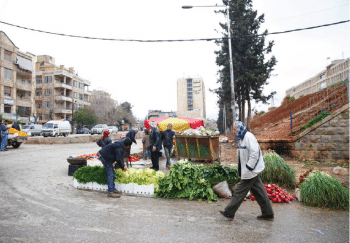 A long time has passed since the demonstrations in March 2011 that the Syrian government suppressed. The old dynamic of the 2005 Damascus Spring was quickly snuffed out. It was improbable that the Syrian opposition would be able to overthrow the government. External intervention from the West, the Gulf Arabs and Turkey months into the uprising transformed the domestic political struggle into a regional proxy war. It was not a surprise that a year into the conflict the extreme political forces – including those inspired by al-Qaeda – had risen to dominate the military opposition forces. Democracy was off the table. This was going to be an extended period of bloodletting.
A long time has passed since the demonstrations in March 2011 that the Syrian government suppressed. The old dynamic of the 2005 Damascus Spring was quickly snuffed out. It was improbable that the Syrian opposition would be able to overthrow the government. External intervention from the West, the Gulf Arabs and Turkey months into the uprising transformed the domestic political struggle into a regional proxy war. It was not a surprise that a year into the conflict the extreme political forces – including those inspired by al-Qaeda – had risen to dominate the military opposition forces. Democracy was off the table. This was going to be an extended period of bloodletting.
After the Russian intervention, one backer of these extreme forces after another began to find the way forward blocked. Not long into this war, the remnants of al-Qaeda in Iraq – the Islamic State of Iraq – entered Syria and expanded its ambitions to become the Islamic State of Iraq and al-Sham (ISIS). The fighters from this sectarian and extremist group whipped across Northern Syria. They threatened to sweep across West Asia, breaking boundaries and capturing territory swiftly. The emergence of ISIS allowed the West to refocus its attention on the war against ISIS and it allowed the Syrian government to define the rebels as terrorists.
The Turkish journalist Vecih Cüzdan told Tricontinental that the entry of Russia into the conflict in September 2015 brought in the ‘power that changed the course of the war.’ It should have been evident to the West, Turkey and the Gulf Arabs that the war was over and that they should urge their proxies to sue for peace. But this is what they did not do. The continuation of the war, with no possible victory for the rebels, has only contributed to the death toll and the further destruction of this great country.
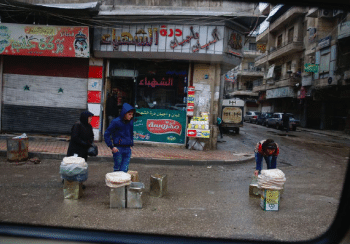 Meanwhile, regional powers have begun to slice up Syria. The Israelis have formed a proxy army to build a buffer zone around the already illegally held Golan Heights. In the north, the Syrian branch of the Kurdish people – a nationality that is spread out across Turkey, Iraq and Iran – formed an enclave called Rojava or western Kurdistan. Turkey, which has opposed any sign of a Kurdish state, intervened to prevent the Syrian Kurds from forming their own state. The Lebanese political movement Hezbollah has built a protective wall along the Syrian-Lebanese border. Iran has helped Syria open the roadway that runs from Iran through Iraq and Syria to Beirut. This will be a crucial artery to resupply Hezbollah. The United States has established a presence in the oil rich east and northeast, with bases that have begun to take on an air of permanence.
Meanwhile, regional powers have begun to slice up Syria. The Israelis have formed a proxy army to build a buffer zone around the already illegally held Golan Heights. In the north, the Syrian branch of the Kurdish people – a nationality that is spread out across Turkey, Iraq and Iran – formed an enclave called Rojava or western Kurdistan. Turkey, which has opposed any sign of a Kurdish state, intervened to prevent the Syrian Kurds from forming their own state. The Lebanese political movement Hezbollah has built a protective wall along the Syrian-Lebanese border. Iran has helped Syria open the roadway that runs from Iran through Iraq and Syria to Beirut. This will be a crucial artery to resupply Hezbollah. The United States has established a presence in the oil rich east and northeast, with bases that have begun to take on an air of permanence.
What to make of this conflict? The details are bewildering. It is difficult to agree on the origins of the conflict. Difficult even to agree on the words to use to define the rebels and the dead. It is hard to understand the seeming endlessness of the war, the bloodletting that has become commonplace.
Endgame?
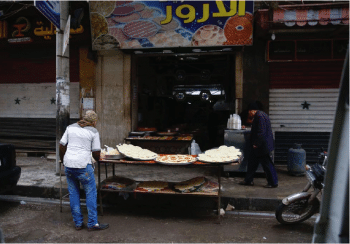 The Syrian government has taken the cities and towns along its western flank, from Dara’a to Aleppo. A small pocket remains in Idlib, where the various extremists and other rebels have been congregated. It is in this town of Idlib that the government sees the final battle for control over Syria. It is already the case that the Turkish government, which had once supported these rebels, has now washed its hands of them. Turkey has decided that it is far more important to quell the Kurdish dreams of autonomy along its border than to overthrow Assad. This means that the rebels no longer have access to an open Turkish border nor do they have access to Gulf Arab money and support. Their political benefactors – whether the Syrian Muslim Brotherhood (based in Istanbul) or the Saudi royal family – have quit the field. The rebels will refuse to surrender and the government will find no avenue for a political settlement with them. The battle of Idlib will be as deadly as the rest of this brutal war.
The Syrian government has taken the cities and towns along its western flank, from Dara’a to Aleppo. A small pocket remains in Idlib, where the various extremists and other rebels have been congregated. It is in this town of Idlib that the government sees the final battle for control over Syria. It is already the case that the Turkish government, which had once supported these rebels, has now washed its hands of them. Turkey has decided that it is far more important to quell the Kurdish dreams of autonomy along its border than to overthrow Assad. This means that the rebels no longer have access to an open Turkish border nor do they have access to Gulf Arab money and support. Their political benefactors – whether the Syrian Muslim Brotherhood (based in Istanbul) or the Saudi royal family – have quit the field. The rebels will refuse to surrender and the government will find no avenue for a political settlement with them. The battle of Idlib will be as deadly as the rest of this brutal war.
Rumours circulate that the Western powers, Saudi Arabia and Israel are eager for a military strike against Damascus to weaken the bargaining position of the Assad government. It is felt that a victory for the Assad government would be a victory for Iran, for Russia and for Hezbollah. The West – mainly the United States – as well as Saudi Arabia and Israel will not tolerate such a victory. Israel finds it objectionable that Syria is now closer to Iran and that Hezbollah can now be rearmed by road through Iraq and Syria. This is also objectionable to Saudi Arabia and to the West. They would have liked to see Iran defeated in the region. But their calculations have not added up.
A victory for Assad, in other words, would be seen as a defeat for the West, for the Saudis and for Israel. Whether this is actually the case, given that Syria is weakened deeply by the human and physical toll of this war, is irrelevant. Whether chemical weapons have been used in this war is again side-lined, since the accusations of their use have been deemed sufficient justification for Western bombardment of the Syrian government’s military assets (as in the 2017 missile strike on the Shayrat base). The presence of Russian troops, however, has stayed the hand of a full-scale assault on the Assad government. This is the first time that the Russians have intervened since the fall of the USSR to prevent a Western military intervention.
The West has long found it hard to settle on allies on the ground for its regime change war in Syria. The fact that so many of the rebel groups seemed to be affiliated to al-Qaeda made it impossible to openly back them. The Free Syrian Army – a rag tag group of defectors and others – was in no position to confront the Syrian army by itself. When ISIS emerged as a threat in the north of Syria, the US turned to the Syrian Kurds for assistance. A combination of US air power and Syrian Kurdish courage on the ground defeated ISIS. But then, when the gains of the Syrian Kurds disturbed the Turks, the United States did nothing to prevent a Turkish intervention. It says a great deal about the complexity of the battlefield that the Syrian Kurds were sacrificed. It also says much about the United States that it could so easily betray its allies.
It is easy to start a war. It is hard to stop it.
To understand the war at this stage, Tricontinental spoke to Syrian economist Omar Dahi. Dahi, who has been involved closely with the Syria project of the United Nation’s Economic and Social Commission of West Asia, is a close observer of the tumult in his native land. The photographs in the dossier are from Damascus and Aleppo. They are taken by a photographer who wishes to remain anonymous.
Tricontinental: What is the current status of the war?
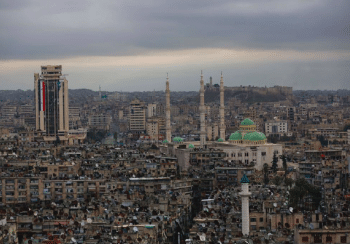 Dahi: The Russian intervention in Syria in September 2015 marked the end not just of the idea of military overthrow of the Syrian government but also that of using military pressure to force the government to the negotiating table. The opposition would also point to Obama’s decision not to attack the regime following the August 2013 Ghouta attacks. From that time on, Russia broke a deadly conflict of attrition that was slowly draining the government’s forces along with its allies given that it was stretched on three fronts (North, East, and South). Russia went on to help the government achieve a series of military victories against anti-government forces throughout the country, the most important of which was that of retaking East Aleppo. Syrian civilians paid an unbearably high cost. Critical infrastructure such as medical facilities were repeatedly targeted.
Dahi: The Russian intervention in Syria in September 2015 marked the end not just of the idea of military overthrow of the Syrian government but also that of using military pressure to force the government to the negotiating table. The opposition would also point to Obama’s decision not to attack the regime following the August 2013 Ghouta attacks. From that time on, Russia broke a deadly conflict of attrition that was slowly draining the government’s forces along with its allies given that it was stretched on three fronts (North, East, and South). Russia went on to help the government achieve a series of military victories against anti-government forces throughout the country, the most important of which was that of retaking East Aleppo. Syrian civilians paid an unbearably high cost. Critical infrastructure such as medical facilities were repeatedly targeted.
Along the same lines, there was a dilemma in the political process. There was a stalemate in the UN-sponsored Geneva process largely due to the lack of clarity about the war. In addition, the parties that are necessary to negotiate a settlement, particularly those who represented fighters on the ground, were not present. To that end, Russia sponsored the Astana Process which would not only include countries like Iran – excluded from Geneva – but also anti-government opposition fighters and militias that were brought to the table by Turkey. The US presence here was minimal. Unfortunately, to bring Turkey on board, the Astana process excluded independent Kurdish or Kurdish-led parties like the Democratic Union Party (PYD) and the Syrian Democratic Forces.
The Astana Process succeeded in bringing about ceasefires in different parts of the country and eventually led to the so-called four ‘De-escalation Zones’ in Idlib, Homs, Ghouta, and along the Jordanian border. These ‘De-escalation Zones’ were set up as places where ceasefires would be enforced. Those zones were the remaining places that had significant anti-government forces present. Throughout this process, al-Qaeda inspired groups such as ISIS and Jabhat al-Nusra (or the Hayat Tahrir al-Sham, as it rebranded itself) were excluded.
While Russia has been militarily successful, politically it has been less so. The best scenario would have been for the government and its allies to arrive at the Geneva peace process with the upper hand, then negotiate a political settlement from that position of strength. This would have required the government to offer the political opposition significant and serious compromises. It could have ushered in a new stage in Syria. In the aftermath of the battle for Aleppo in 2016, there was a missed opportunity. The Syrian government’s desire to push for a full victory must be blamed in large part for this. It appears that Russia wanted this to be the course of action. But it did not occur. Each subsequent negotiation seemed farcical, including the Sochi ‘Syrian National Dialogue’ of January 2018.
This has been the story of the conflict. Whenever a side is on the upswing, it pushes for a full victory rather than a compromise. Playing the geo-political battle and negotiating with outside powers cannot substitute for a historic compromise with one’s own population. Sooner or later the government will run out of deals to make with external powers when the ones they should be making are with their own population.
We are now seeing the end of the ‘de-escalation zones’ with attacks in Ghouta and Idlib in the past months. The violations have been from all sides. This has more or less coincided with the failure of the Russia-engineered political solution. Why is this happening?
For their part Syria’s regional enemies may not have achieved their goals but they are in no rush to hand the government a complete victory.
The chief concern, of course, is the way that the United States has positioned and entrenched itself in Syria. It took the pretext of ISIS to solidify control over territory, particularly in oil-rich areas. The US lacks a clear endgame in Syria but it is building up a longer-term presence through military bases. It uses the remnants of ISIS as a pretext to push back against Iran and Hezbollah as well as to pressure Damascus. The longer-term build up is a US military-led policy that is not tied a specific administration: it started late in the Obama administration and has continued under President Trump.
Consolidation of the US military presence in Syria caused the Syrian government to solidify its control over other parts of Syria, including those previously marked for de-escalation. US airpower gave the Kurds the ability to increase their territory, which pushed the Syrian Kurds into a confrontation with Turkey. The more the US pushes for territory and power in Syria, the more chaos ensues.
The Syrian people are exhausted. The regional powers should fight their battles elsewhere. Throughout the past years, the framing of the conflict (by all sides) in narrow terms, such as whether every action is pro-Assad or anti-Assad, has served to distract from the way the Syrian state, its institutions, its environment and its capacity to sustain a population, is being destroyed.
Tricontinental: Do you feel that there is any hope for a reconciliation between the parties? If so, what are the parties that should be at the table for a reconciliation?
Dahi: Reconciliation is a longer-term process. If what you mean is a political settlement, even the possibility of beginning that process seems unlikely right now. A political settlement should be Syrian-led and offer a true and historic negotiation between the government and the main sectors of the political and military opposition, including the now displaced or ‘external’ opposition. Of course, this process must also include Syrian Kurdish or Kurdish-led political parties. However, every escalation, every bullet or bomb or mortar dropped against another Syrian is a further step towards the destruction of Syria.
Within Syria there is today, and has been since 2011, a wide spectrum of opinions. There are those loyalists who oppose the savage bombing of Ghouta and humiliation of its population. On the other side there are those in the opposition who have criticised the crimes committed in the name of the revolution. They know full well why many oppositional groups have lost credibility as they readily accepted the influence and agendas of external forces. Many of those same people have also lost loved ones during the conflict. Most do not truly feel that any side represents them. However, they are either too scared or too resigned to speak out. They are not interviewed on television. They do not post on social media. It is these voices that can lead the process of reconciliation and reckoning with the terrible legacy of the war one day. For now they are silent, or more accurately have been silenced.
For those on the outside wishing to see and engage with Syria in a positive way that truly centres Syrians, all Syrians, there is an important point to be made here. Dial down the rhetorical overkill. The debate about Syria seems to mirror the military battle taking place there, a proxy war of sorts where some activists, journalists and academics see themselves as foot soldiers of the different combatting sides. We need a different and more generous kind of critical engagement that does not replicate the war itself.
Tricontinental: What has happened to the Muslim Brotherhood groupings now that Qatar and Saudi Arabia as well as Turkey appear to have lost interest in the war in Syria?
Dahi: The Syrian branch of the Muslim Brotherhood was empowered by Turkey and Qatar in 2011. It was based largely in Istanbul (Turkey). The Brotherhood is not solely a political organisation. To be relevant in the Syrian war, it sponsored several military outfits, including the so-called Shields of the Revolution around Idlib. None of these were decisive on the ground and most of its members have defected to more radical formations.
When the coup against the Egyptian branch of the Muslim Brotherhood took place in 2013, the Brotherhood saw its fortunes decline across the region. Saudi Arabia, in its fight with Qatar, has attempted to set aside the Muslim Brotherhood and push its own proxies forward. The Russian intervention complicated issues for Turkey. It began to increase its dealings with Russia and Iran, allies of the Syrian government. This meant that the Syrian opposition – as well as the Syrian Muslim Brotherhood – saw its influence lessen.
The Muslim Brotherhood is still there, but less empowered and either marginalised or regrouped in other political bodies. This long process has also created divisions within the Muslim Brotherhood itself along generational and ideological lines with the younger section tending to be sceptical of the top-heavy decision making and pragmatism of the old generation. The Muslim Brotherhood faced a challenge. Should it emphasise its Islamist or its liberal credentials? Who would it appeal to as the opposition landscape inside Syria began to become more extremist?
The Syrian Muslim Brotherhood remains, but it is severely weakened.
Tricontinental: Will the Assad government be able to raise the resources for reconstruction?
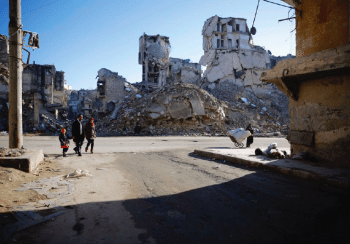 Dahi: No. The level of destruction is too large. Syria’s Gross Domestic Product is estimated to have shrunk to less than 45% of its 2012 value and physical capital destruction alone is estimated at $100 billion. This is a vast amount of money. As long as there is no UN-sponsored political settlement, there will be no reconstruction funds coming from the United States and the Gulf. Europe, which is not unwilling to fund reconstruction, will not do so as long as the United States is hesitant. Europe will not lead on its own.
Dahi: No. The level of destruction is too large. Syria’s Gross Domestic Product is estimated to have shrunk to less than 45% of its 2012 value and physical capital destruction alone is estimated at $100 billion. This is a vast amount of money. As long as there is no UN-sponsored political settlement, there will be no reconstruction funds coming from the United States and the Gulf. Europe, which is not unwilling to fund reconstruction, will not do so as long as the United States is hesitant. Europe will not lead on its own.
Iran and Russia will not be able to provide the funds. It is not clear how much China is willing to invest at this point.
Patchwork reconstruction will be the order of the day. Most of this is happening through land grabs and contracts from the government to its allies. Or else by outside powers who have taken hold of territory – whether by the United States in the north-east or Turkey in the north-west.
The form of reconstruction that is now ongoing is fragmenting the country. Displaced Syrians will be forever banished from their homeland. Land, once part of Syria, is now being seized by outside powers. Syria is being permanently broken.
This is why it is urgent that the military conflict must end. It is why a political settlement is necessary. Otherwise, Syria will have no future.

